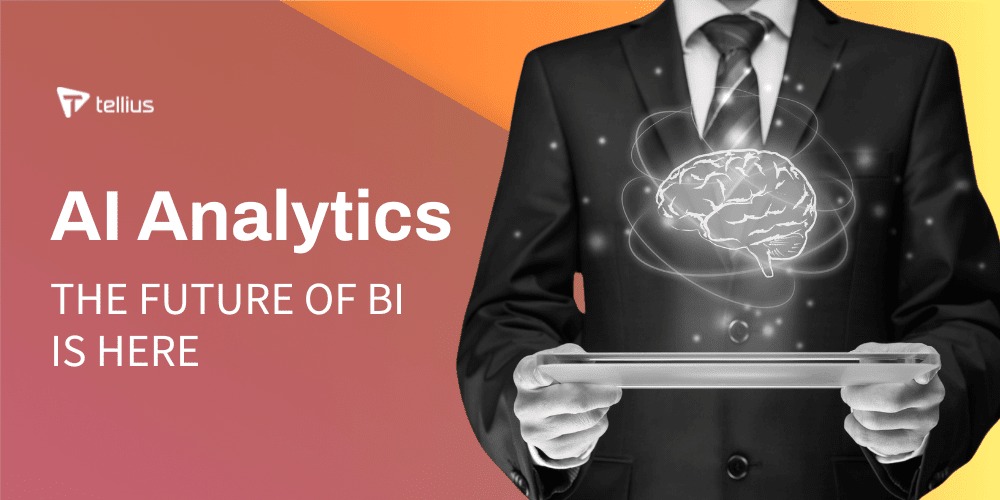How AI Analytics is Shaping the Future of Business Intelligence
 Tellius Usa
Tellius Usa
In an era where data drives decisions, the fusion of artificial intelligence (AI) and analytics is redefining the landscape of business intelligence (BI). AI analytics, with its sophisticated algorithms and machine learning capabilities, is transforming how organizations collect, process, and utilize data. This evolution is not only enhancing traditional BI practices but also paving the way for more dynamic and insightful decision-making.
Enhanced Data Processing and Analysis
Traditional BI systems often rely on predefined queries and static reports, which can be limiting in rapidly changing business environments. AI analytics, on the other hand, leverages advanced algorithms and machine learning models to process and analyze vast amounts of data in real-time. This capability allows organizations to uncover deeper insights, identify patterns, and make more informed decisions quickly. AI-driven analytics tools can handle complex datasets, including unstructured data from social media and customer feedback, providing a more comprehensive view of business performance.

Predictive and Prescriptive Insights
One of the most significant advancements brought by AI analytics is the ability to generate predictive and prescriptive insights. Predictive analytics uses historical data and machine learning models to forecast future trends and behaviors, helping organizations anticipate market changes and customer needs. This combination enables businesses to proactively address potential issues, optimize strategies, and seize opportunities before they arise, thus gaining a competitive edge.
Improved Data Visualization and Interpretation
AI analytics enhances data visualization by offering interactive and intuitive dashboards that make complex data more accessible and understandable. Advanced AI tools can automatically generate visualizations that highlight key trends and insights, eliminating the need for manual data manipulation. Machine learning algorithms can also provide contextual information and explanations, helping users interpret data more effectively. This improved data visualization supports better decision-making by presenting information in a clear and actionable format.
Real-Time Decision-Making
In today’s fast-paced business environment, the ability to make decisions in real-time is crucial. AI analytics enables real-time data processing and analysis, allowing organizations to respond quickly to emerging trends and market conditions. For example, AI-powered analytics can monitor sales performance, customer behavior, and supply chain metrics in real time, providing actionable insights that drive immediate decision-making. This agility is essential for staying competitive and adapting to rapid changes in the market.
Enhanced Personalization and Customer Insights
AI analytics is revolutionizing customer relationship management by providing deeper insights into customer preferences and behaviors. Machine learning algorithms can analyze customer data to identify patterns and segment audiences more accurately. This level of personalization enables businesses to tailor their products, services, and marketing efforts to individual customer needs and preferences. By understanding and anticipating customer behavior, organizations can enhance customer satisfaction and loyalty, driving long-term success.
Automation of Routine Tasks
AI analytics also contributes to business intelligence by automating routine data analysis tasks. Tasks such as data cleaning, report generation, and trend identification can be performed automatically by AI algorithms, freeing up valuable time for data professionals to focus on strategic analysis and decision-making. This automation not only increases efficiency but also reduces the risk of human error, leading to more accurate and reliable insights.
Integration with Other Technologies
The future of BI is increasingly interconnected, with AI analytics playing a central role in integrating various technologies. AI-driven analytics can seamlessly integrate with other systems, such as customer relationship management (CRM) platforms, enterprise resource planning (ERP) systems, and Internet of Things (IoT) devices. This integration provides a holistic view of business operations and enhances the ability to make data-driven decisions across different functions and departments.
AI analytics is significantly shaping the future of business intelligence by enhancing data processing, enabling predictive and prescriptive insights, improving data visualization, and facilitating real-time decision-making. Its ability to automate routine tasks, provide personalized customer insights, and integrate with other technologies is revolutionizing how organizations approach data analysis and decision-making. As AI continues to evolve, its impact on business intelligence will only grow, offering new opportunities for organizations to drive innovation, efficiency, and success in an increasingly data-driven world.
Subscribe to my newsletter
Read articles from Tellius Usa directly inside your inbox. Subscribe to the newsletter, and don't miss out.
Written by
